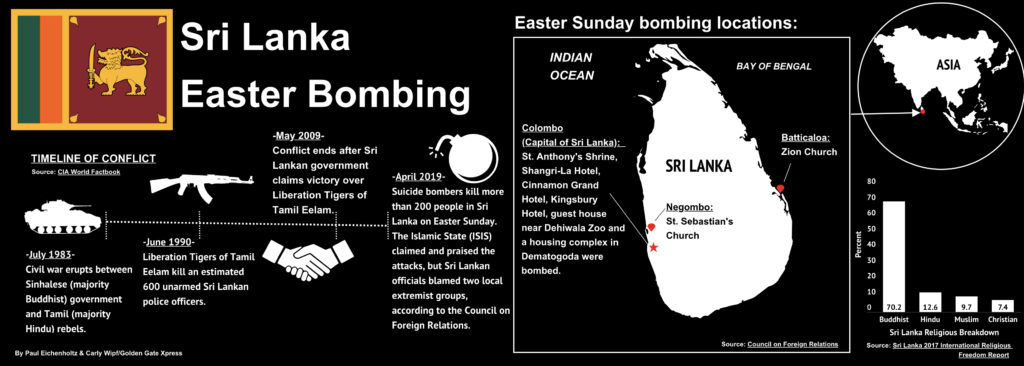INFOGRAPHIC CREATED BY PAUL EICHENHOLTZ AND CARLY WIPF/Golden Gate Xpress
Less than a week after coordinated suicide bombings in Sri Lanka claimed hundreds of lives on Easter Sunday, the Associated Press reported 15 more people—including six children—died on April 26 after militants connected to the original attacks used explosives and gunfire against Sri Lankan security forces.
When SF State associate English professor and Sri Lanka native Priyanvada Abeywickrama heard more than 250 people died in a series of Islamic State-claimed bombings in her hometown, she immediately contacted her family and friends.
“Everyone I contacted, they were fine,” Abeywickrama said. Yet she said she was sure in the coming days that she would be hearing from other colleagues who were affected by the attacks that targeted six hotels and churches.
According to Abeywickrama, the bombings were an eerie reminder of a darker time in Sri Lankan history, when the country was plagued by civil war for almost 30 years.
“The horror of what happened is the same no matter what period of time you are in,” Abeywickrama said. “But I think for a lot of us, [the attack on Easter] took us back—it sort of reactivated memories that we have all sort of put behind us.”
Before she worked at SF State, Abeywickrama was a professor at the University of Colombo in Sri Lanka. She said she heard bombings throughout her time there and vividly remembered an explosion that happened as she was walking down a university hallway.
“When the explosion happened, we were right next to the chemistry building and our immediate thought was that there was an explosion in the chemistry building,” Abeywickrama said. “But little did we know that just maybe like a quarter-mile down the road there had been a car suicide bombing.”
She said Sri Lanka was relatively peaceful with a recovering economy and growing tourism industry before the April 21 attacks.
Second-year SF State cinema major Abi Watson said, while she didn’t have any specific plans to visit Sri Lanka, the tragic events that occurred would not deter her from traveling there.
“There are terrorist attacks all over the world,” Watson said. “It’s scary, but giving into it like that lets [terrorism] win.”
Watson, who is not religious, said she wasn’t sure if it was a coincidence that these attacks were carried out on Easter.
Rev. Ellen Clark-King, an executive pastor at Grace Cathedral Church in San Francisco, said the religious significance of Easter likely motivated the attacks.
“Religious buildings, religious gatherings are soft targets because we try in all our different religions—in mosques, synagogues, and churches—to be as open as we can and to exclude nobody as far as we can,” Clark-King said. “And Easter, doing it on that day gives them probably more publicity and causes more fear and grief and sadness among those affected.”
Abeywickrama said the attacks are unique due to the fact that both Christians and Muslims—the two religious parties involved—make up a small minority of Sri Lankan religious observers. Even during the Sri Lankan civil war, feuds took place between the mainly Hindu Liberation Tigers of Tamil Eelam and the majority Sinhalese Buddhist government, according to the Council on Foreign Relations.
The 2017 International Religious Freedom Report states that 70.2 percent of Sri Lankans are practicing Buddhists, 12.6 percent are Hindu, 9.7 percent are Muslim and 7.4 percent are Christian.
The Sri Lankan New Year passed on April 14, a week before Easter. Abeywickrama said if there was any countrywide tension or if someone was unhappy with the internal political situation, they would have targeted the Buddhist majority during the new year festivities.
“For me [the recent attack] clearly stands out as something outside of what’s happening in Sri Lanka. You can relate this to what’s happening in the rest of the world,” Abeywickrama said.
According to the Global Terrorism Index, 67 countries reported at least one terrorism-related death in 2017. This number fell from 79 countries in 2016, the highest number of countries on record to feel the effects of terrorism.
The reduction in attacks globally are indicative of the Islamic State’s decline, according to the Global Terrorism Index. The SITE Intelligence Group, known for monitoring extremist groups, reported ISIS supported and praised the Sri Lanka bombings. SITE also quoted an Indonesian offshoot of ISIS that said, “Allah willing, there will be another more powerful attack.”
AP reported on April 26 that religious leaders in Sri Lanka halted Sunday masses for the foreseeable future in light of the suicide bombings.
Clark-King said Grace Cathedral will do its best to remain open to the Bay Area public.
“We never want to be in a place where we are having to put metal detectors and things like that on any of our churches,” Clark-King said.
On Easter Sunday, those who attended services at Grace Cathedral took a minute of silence in remembrance of the fallen in Sri Lanka.
“The main takeaway for me is even though this happened on Easter Sunday, all of our faiths teach us that hatred and violence and death are never going to have the last word,” Clark-King said. “But love and life will always triumph.”











